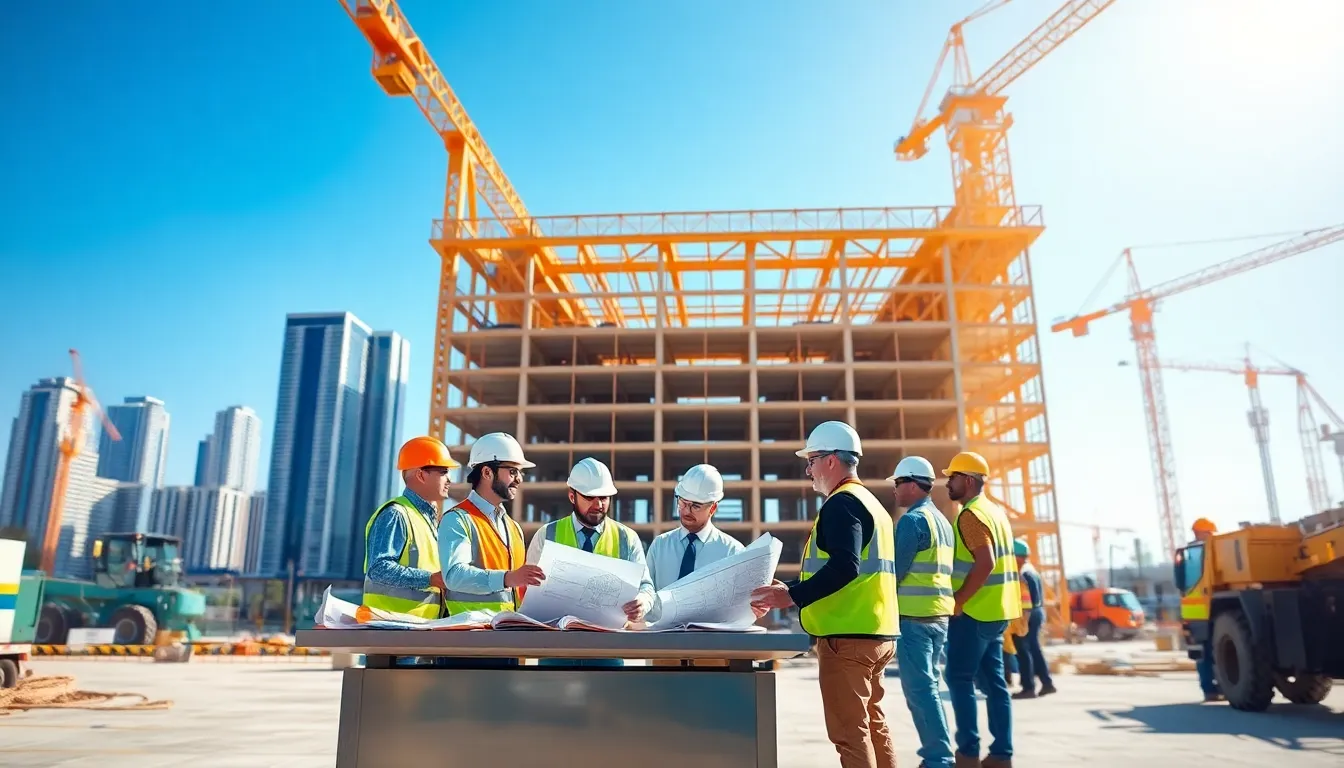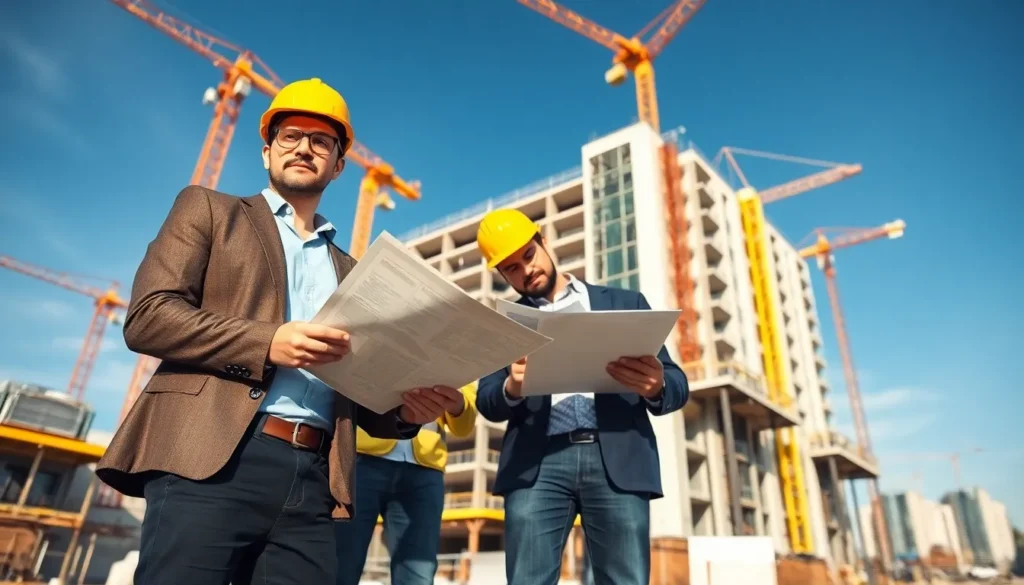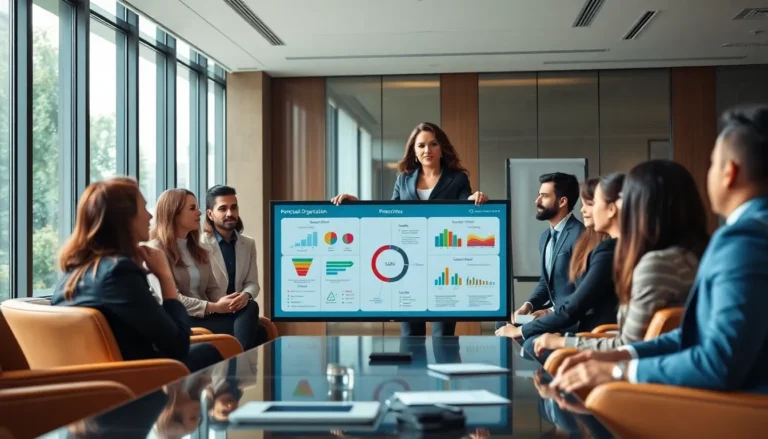If you’ve ever thought about what goes into that shiny new office building down the street, you’re in for a treat. Commercial building construction isn’t just about bricks and mortar: it’s about bringing visions to life. Whether it’s a retail space or a corporate headquarters, the stakes are high, and the planning is meticulous. With a blend of humor and expertise, let’s jump into the world of commercial construction services and discover how these modern-day architects turn blueprints into bustling businesses.
Table of Contents
ToggleOverview of Commercial Building Construction

Commercial building construction is a multi-faceted try that involves more than just physical construction. It’s a complex orchestration of planning, design, and execution, tailored to create spaces that meet business needs. This type of construction is characterized by its scale, often involving larger budgets and longer timelines than residential projects. From skyscrapers to shopping malls, the commercial sector has a unique set of challenges and components that differentiate it from other types of construction.
Builders must navigate local regulations, secure permits, and ensure that projects comply with safety standards. Each phase of construction plays a crucial role, from site prep to final inspections, ensuring that the finished product is not only functional but also aesthetically pleasing. This overview only scratches the surface: each project has unique requirements that can influence every decision made along the way.
Types of Commercial Buildings
The variety of commercial buildings is as diverse as the businesses that occupy them. Here are a few common types:
Office Buildings
These structures are designed primarily for workplaces. They can range from small office parks to towering high-rises.
Retail Spaces
From cozy boutiques to expansive shopping centers, retail spaces cater to consumer shopping needs in unique ways.
Industrial Facilities
Manufacturing plants, warehouses, and distribution centers fall into this category, supporting the back-end of many businesses.
Hospitality
Hotels, motels, and restaurants are part of this segment, often requiring specialized design to create inviting atmospheres.
Mixed-Use Developments
These innovative spaces combine residential, commercial, and sometimes industrial elements, fostering community interaction and convenience.
Each building type comes with its own set of regulations, requirements, and design considerations, which means construction services must adapt accordingly.
Key Phases in Commercial Construction
Understanding the phases of commercial construction is essential for successful project execution. Here’s a breakdown of the key stages:
Pre-Construction
This initial phase includes site selection, budgeting, and securing permits. Every detail is considered before any physical work begins.
Design
Architects and engineers get involved here. They create schematics and models, collaborating with clients to ensure the vision is clear and feasible.
Construction
Finally, the ground gets broken. This phase consists of various tasks like excavation, foundation laying, and eventual framework erection. Skilled labor performs these tasks under the guidance of experienced project managers.
Inspections and Approvals
Periodic inspections ensure that everything is up to code. This is where all the hard work gets verified by local authorities.
Completion
The last phase includes final walkthroughs, adjustments, and handing over the keys to the client. It’s the moment when a vision turns into reality.
Choosing the Right Construction Services
Choosing the right construction services can feel like trying to pick a favorite star in the night sky, it’s not easy. Here are some factors to consider:
Experience and Reputation
Look for companies with a solid portfolio and positive reviews. Experienced builders are more likely to anticipate challenges and come up with effective solutions.
Specialization
Some firms specialize in certain types of commercial buildings. If you’re constructing a hospital, find services that have experience in medical facilities.
Cost
While it’s important to stay within budget, the cheapest option isn’t always the best. Evaluate what’s included in bids, and look for quality over quantity.
Communication
Strong communication is key. Choose a firm that is responsive and prioritizes collaboration, keeping you in the loop throughout the project.
Sustainability in Commercial Construction
Sustainability is no longer just a buzzword: it’s becoming a necessity in commercial construction. Here’s how builders are turning greener:
Material Sourcing
Eco-friendly building materials are gaining popularity, reducing environmental impact without compromising quality.
Energy-Efficient Designs
Designing buildings that maximize natural light and use renewable energy sources can significantly lower operational costs.
Waste Reduction Strategies
Implementing waste management plans during construction can minimize landfill contributions, making a positive impact on the planet.
Clients increasingly demand sustainable options, prompting construction companies to integrate environmental responsibility into their services.
The Role of Technology in Construction Services
Technology has revolutionized the construction sector, offering solutions that streamline processes and enhance outcomes. Let’s explore some tech trends:
Building Information Modeling (BIM)
BIM allows for a 3D modeling approach, giving teams a visual representation of projects before they begin. This minimizes errors and boosts communication among stakeholders.
Drones
Drones help survey sites and monitor progress, providing data that was previously time-consuming to gather.
Project Management Software
This technology enhances coordination among various teams, ensuring transparency and accountability.
From design to execution, technology is changing the landscape of commercial construction, making projects more efficient and accessible.
Future Trends in Commercial Building Construction
As we look forward to the future, a few exciting trends are emerging in commercial building construction:
Smart Buildings
Buildings equipped with technology that controls lighting, security, and HVAC systems are becoming increasingly common.
Modular Construction
Prefabricated components can speed up the building process and reduce costs, offering flexibility and efficiency.
Renewable Energy Integration
More buildings will incorporate solar panels and other renewable resources, decreasing dependency on non-renewable energy.
Urban Infill
With rising populations, there is a growing trend towards building in urban areas, repurposing existing structures for new uses.



